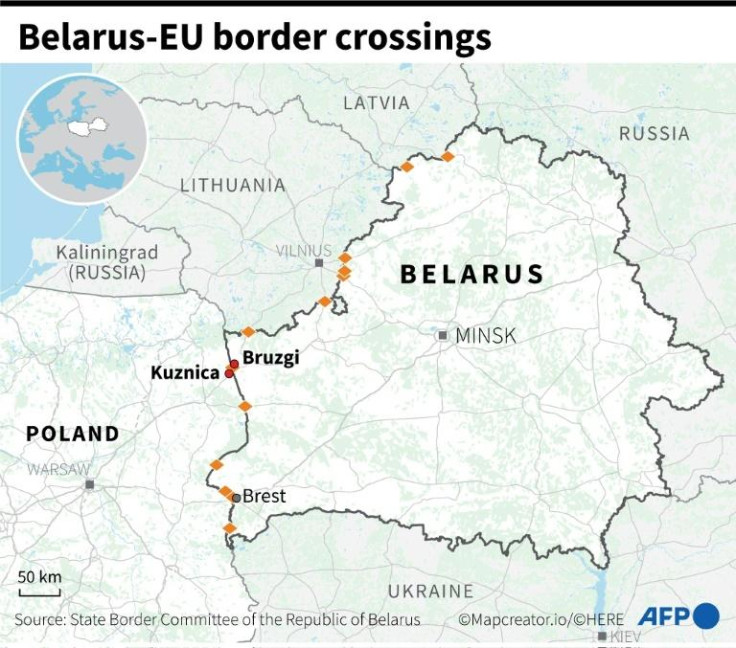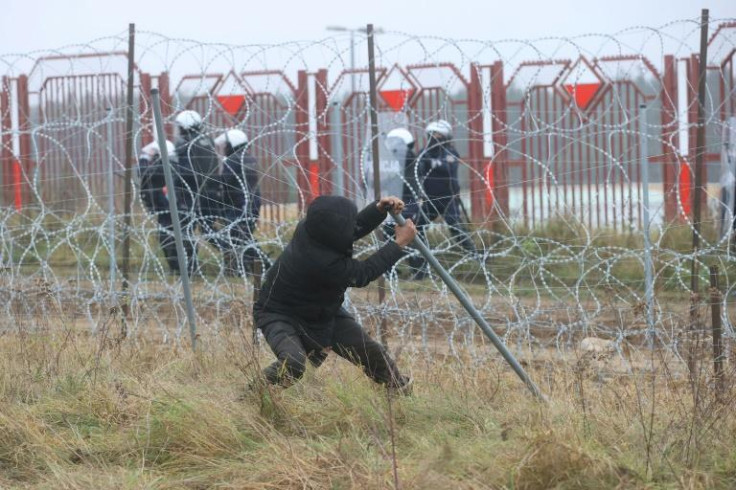Poles fire tear gas, water cannon at migrants on Belarus border
Belarusian foreign ministry spokesman Anataoly Glaz accused Poland of exacerbating the problem.
Polish forces fired tear gas and water cannon on Tuesday at stone-throwing migrants trying to cross the Belarusian border, sparking accusations from Belarus that EU and NATO member Poland was trying to escalate the crisis.
Polish border guards, who are deployed along with the army and police, estimate up to 4,000 migrants are currently camped out on the frontier between Poland and Belarus in increasingly dire conditions and freezing temperatures.
Western powers accuse Belarus leader Alexander Lukashenko of orchestrating the crisis, possibly with Russia's backing, by luring migrants to the border to sow division in the European Union -- claims denied by Minsk and Moscow.

A standoff near the Bruzgi-Kuznica border crossing on the EU's eastern frontier began last week when hundreds of migrants gathered there.
"Migrants attacked our soldiers and officers with rocks and are trying to destroy the fence and cross into Poland," Poland's defence ministry said on Tuesday, tweeting a video showing apparent clashes at the border.
"Our forces used tear gas to quell the migrants' aggression."
Seven police officers, a border guard and a soldier were injured in the clashes, Polish officials said, with police saying stun grenades and tear gas canisters had also been thrown at officers.
The Belarusian health ministry said that around 20 migrants camping out at the border had received medical assistance in the last few days, including five people treated for eye and respiratory problems in the last few hours.
Belarus also said it was setting up a "logistic centre" in the Grodno region where migrants could sleep.
Belarusian foreign ministry spokesman Anataoly Glaz accused Poland of exacerbating the problem.
"We see today from the Polish side direct provocations and inhumane treatment of the disadvantaged," he said.
Russia also condemned Poland's use of tear gas and water cannon against the migrants, with Foreign Minister Sergei Lavrov calling it "absolutely unacceptable".

Visiting areas near the border on the Polish side, the Council of Europe human rights commissioner Dunja Mijatovic on Tuesday said the situation was "extremely dangerous".
"We need to find a way to de-escalate, to make sure the focus is really to stop the suffering," she told reporters.
She also called for aid groups and the media to be given "full access" as they are currently banned from the immediate area under a state of emergency law in Poland.
Lukashenko, who has crushed opposition to his rule over nearly three decades in power, discussed the crisis with German Chancellor Angela Merkel on Monday.
It was his first phone call with a Western leader since he suppressed mass protests against his rule last year.
Merkel's office said the pair discussed bringing humanitarian aid to the migrants, whose number includes many young children.
Lukashenko on Tuesday said he and Merkel agreed the standoff should be defused.
"We were of the united opinion that nobody needs escalation -- not the EU, or Belarus," he told a government meeting, quoted by Belta news agency.
But he said he had "differing" views with Merkel on how the migrants got to Belarus, with the West saying Minsk had brought them there as revenge for sanctions.
EU foreign ministers on Monday agreed that existing sanctions targeting Lukashenko's regime will be expanded to include individuals or companies found to have encouraged border crossings.
The US has also vowed to expand its sanctions on Belarus.
Iraq has said it will start voluntary repatriations of its citizens from Belarus this week.
The Iraqi embassy in Moscow said it would fly out around 200 people in a flight on Thursday.
But many migrants -- including those AFP has spoken to -- have vowed not to go back.
Several airlines have also announced plans to stop the flow of migrants to Belarus.
Turkish Airlines has now banned Iraqis, Syrians and Yemenis from flying to Belarus via Turkey and private Syrian carrier Cham Wings Airlines has said it will halt flights to Minsk.
At least 11 migrants have died on both sides since they began arriving at the border over the summer, according to aid groups.
Copyright AFP. All rights reserved.
This article is copyrighted by International Business Times, the business news leader





















